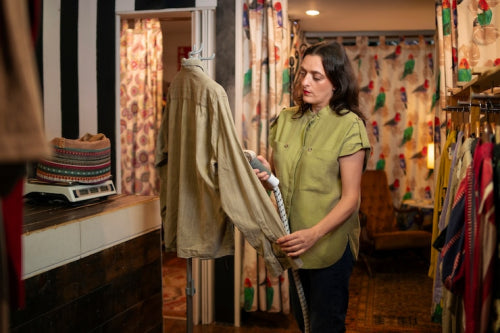Handloom Weavers Find New Markets Through Bangalore-Based Brand

Quick Listen:
In a quiet Karnataka village, a weaver's loom hums with purpose, crafting a silk saree destined for a wardrobe in Dubai or New York. Once limited to local bazaars, this artisan's work now travels the world through IndieHaat, a Bangalore-based platform revolutionizing how India's handloom artisans connect with global buyers. By blending tradition with technology, IndieHaat empowers craftspeople to showcase their handmade textiles woven from pure linen, silk, and cotton in markets across India, the US, Singapore, Australia, the UK, and the UAE.
This isn't just commerce; it's a movement. The global handloom products market, valued at $8.32 billion in 2024, is projected to soar to $16.62 billion by 2032, growing at a 9.24% CAGR, according to a Fortune Business Insights report. IndieHaat stands at the forefront, championing authenticity in an industry often diluted by mass production. Its focus on sustainable, culturally significant products resonates with consumers seeking meaning in their purchases, from Mumbai to Melbourne.
Fast fashion erodes cultural heritage, sidelining artisans and reducing traditions to trends. At IndieHaat, we champion India's craftspeople with handcrafted sarees, apparel, dcor, and skincare rooted in authenticity. Each piece embodies skill and ethical care. Support artisans and preserve India's timeless legacy Shop Now!
A Digital Renaissance for Artisans
The demand for artisanal goods is surging. In boutiques from Singapore to Sydney, handwoven scarves and embroidered kurtas are displayed like gallery pieces, reflecting a global shift toward heritage and sustainability. Social media fuels this trend, transforming platforms like Instagram, Facebook, and YouTube into vibrant marketplaces. Accounts like anilarubyraj and svishala74 don't just sell products; they weave narratives, sharing artisan's stories with followers who become loyal customers.
Digitization is key to this transformation. A 2025 study highlights the challenges small Indian textile enterprises face in adopting sustainable practices, citing unclear metrics and frameworks. IndieHaat sidesteps these barriers by leveraging e-commerce to connect artisans directly with buyers, bypassing convoluted supply chains. A weaver in Tamil Nadu can now sell a shawl to a Londoner without leaving her loom, a feat unimaginable a decade ago.
From Village Looms to Global Wardrobes
Picture a cotton kurta, dyed with natural indigo in Gujarat, uploaded to IndieHaat's platform. A Melbourne buyer spots it via an Instagram post by varshaoak, drawn in by the artisan's story. She orders, and soon the kurta becomes a staple in her wardrobe a slice of India's heritage in her daily life. This is IndieHaat's model: direct sourcing from artisans, ensuring every sale supports a craftsperson, not a factory.
Unlike FabIndia, which boasts 327 stores in India and 14 abroad with 1,688 crore ($200 million) in FY23 revenue, IndieHaat keeps its approach intimate. It competes with brands like Suta, Jaypore, and Koskii by prioritizing exclusive designs and pure fabrics, avoiding synthetic blends that compromise quality. Artisans have shared that their first international sales through IndieHaat felt like milestones, reflecting pride in seeing their work valued globally.
This impact extends across IndieHaat's target regions. In the UAE, buyers seek authentic sarees for cultural events; in the US, eco-conscious shoppers covet handwoven scarves. The platform's focus on storytelling highlighting artisan's villages and techniques builds an emotional connection that transcends borders.
Navigating the Challenges of Handmade
IndieHaat's journey isn't without hurdles. Pricing is a persistent issue. A handwoven silk saree, requiring days of labor, might cost $100 or more, a stark contrast to fast fashion's $10 tops. In markets used to mass-produced goods, this can deter buyers. Trust is another obstacle. Online shoppers, unable to feel the fabric, question authenticity. Comments on social media reflect this skepticism, with some questioning whether products are truly handmade. Competition from brands like Okhai or Chidiyaa, which offer cheaper alternatives, often at the cost of artisan wages, adds pressure.
The tactile barrier is particularly tough. A US buyer commented on drminimalhotra, The designs are stunning, but I want to touch the fabric. Without physical stores, IndieHaat must bridge this gap digitally, a challenge in an industry where texture is king.
Turning Obstacles into Strengths
IndieHaat tackles these issues head-on. To counter price sensitivity, it emphasizes value over cost. Product pages detail the artisan's craft, village, and hours invested, framing a $100 saree as a cultural investment. This aligns with market trends: a Persistence Market Research report forecasts the handloom market growing from $8.3 billion in 2023 to $15.6 billion by 2030 at a 9.3% CAGR, driven by ethical consumers.
Trust-building is central. IndieHaat uses social media to showcase authenticity YouTube videos capture weavers at work, while Instagram reels by ani_lakshmi display customers in IndieHaat pieces. Detailed fabric guides and virtual consultations further reassure buyers. In the UAE and Singapore, pop-up events let customers handle products, while online shoppers benefit from sample swatches and flexible returns. These efforts echo North America's rising demand for artisanal goods, as noted in a Future Market Insights report.
Storytelling is IndieHaat's secret weapon. By humanizing the supply chain, it transforms skepticism into loyalty. A buyer in Australia shared on social media that learning about the weaver's process changed her perspective.
Competing in a Crowded Market
IndieHaat's unique differentiators direct artisan sourcing, pure fabrics, and exclusive designs set it apart. Unlike VeryMuchIndian or Dressfolk, which blend handmade and machine-made offerings, IndieHaat remains uncompromisingly artisanal. This purity appeals to diasporic communities in the UK and US, who seek authentic Indian textiles, and eco-conscious buyers in Australia and Singapore, who value sustainability.
Yet, competition is fierce. FabIndia's scale and Gotitli's affordability pose challenges. IndieHaat counters with niche appeal, targeting buyers who prioritize quality over quantity. Its social media strategy leveraging Instagram, Facebook, and YouTube amplifies this edge, creating a community around its brand.
The Road Ahead for Handlooms
IndieHaat's vision extends beyond sales. It plans to onboard artisans from underrepresented regions, like Northeast India, preserving diverse weaving traditions. Enhanced logistics, including faster shipping to the US and UK, will meet rising demand. A blog series profiling artisans is in the works, deepening customer engagement through storytelling.
The market is ripe but competitive. Asia Pacific holds a 55.77% share of the handloom market, per the Fortune Business Insights report, yet global players vie for dominance. IndieHaat's strength lies in its authenticity an unwavering commitment to handmade quality and artisan welfare. This ethos positions it to capture the growing ethical consumer base, from Dubai's luxury shoppers to Singapore's sustainability advocates.
In Karnataka, the weaver finishes her turmeric-dyed linen scarf, bound for Chicago. She pauses, her fingers tracing the fabric's weave. Through IndieHaat, her craft transcends borders, weaving a future where tradition and technology coexist. As the platform scales, it carries forward a promise: to keep India's handlooms thriving in a digital world.
Disclaimer: The above helpful resources content contains personal opinions and experiences. The information provided is for general knowledge and does not constitute professional advice.
You may also be interested in: Buy Hand Painted Organza Silk Joyful Pink Saree Online
Fast fashion erodes cultural heritage, sidelining artisans and reducing traditions to trends. At IndieHaat, we champion India's craftspeople with handcrafted sarees, apparel, dcor, and skincare rooted in authenticity. Each piece embodies skill and ethical care. Support artisans and preserve India's timeless legacy Shop Now!
Powered by flareAI.co





